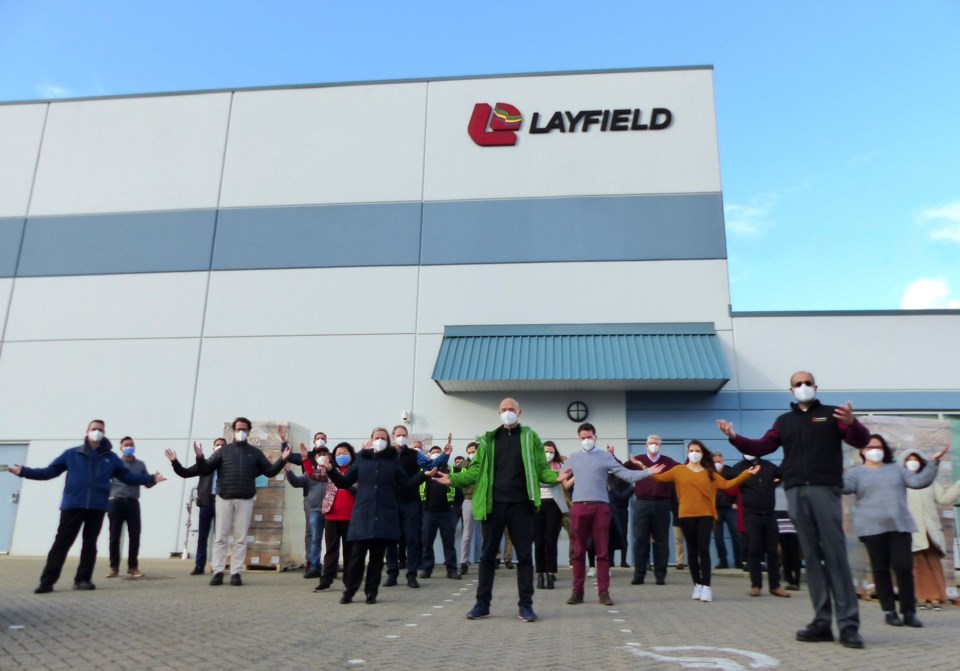A Richmond-based manufacturer should be operating at full capacity right now producing surgical face masks. Instead the factory sits idle while hundreds of thousands of masks sit on shelves collecting dust, according to Mark Rose, president of Layfield Group.
Layfield launched its mask manufacturing division last September and within months had tens of thousands of surgical masks rolling off its assembly line. However, to date, the company has not received a single government order for the personal protective equipment (PPE) and staff have had to be laid off, said Rose.
Early in the pandemic, the Government of Canada called on Canadian manufacturers to step up to help meet the country's need for PPEs, said Rose. Layfied did just that, but the government hasn’t followed up with actual orders, and now Layfield is left with a lot of masks it can’t sell.
It may seem rash in hindsight, but government bids required fast delivery times and it seemed PPEs and face masks would be "urgently needed" by Canadians, so Layfield quickly retooled its factory to meet the demand.
"For a myriad of reasons, we took that leap of faith," said Rose.
A leap he now questions, given that most distributors, who are also importers, choose to purchase low-cost masks from overseas, and hospital systems have stuck with industrial giants for supplies, said Rose.
China dominates PPE production
Selling online is also not an option because Amazon won’t sell N95 or medical-grade face masks to the public on its site during the COVID-19 crisis in an effort to save medical gear for healthcare workers.
But while local businesses are having trouble securing orders for their masks, millions of masks have been imported to Canada from overseas.
According to a recent report from Statistics Canada, in 2019, 53.0 per cent of Canada's imports of face masks of textile materials (this includes surgical masks) came from the U.S., with another 26.4 per cent from China. This shifted in 2020 with 90.7 per cent originating in China, and 3.3 per cent from the U.S.
In 2019, Canada's imported about $2.6 million worth of textile face-masks from China. In 2020, the value was about $1.5 billion, according to data obtained from Statistics Canada.
"We just want to play a fair game, but it seems to go in the opposite direction," said Rose.
"We really need to protect our manufacturers in Canada better as there are very few manufacturers that are profitable anymore...The profits for any of these devices should be staying in Canada because our workers pay taxes here, which benefit the whole economy."
Rose also noted that the lack of clear guidance on Canadian-standards for high-quality mask-wearing is another hurdle his business has faced.
"The health officials should give the public clear guidance to make sure that people like restaurant workers wear a high-quality mask that actually protects everybody, which would help flatten the curve. There is no clear guidance to the public regarding what standard of face mask is required," said Rose.
New vendor needs to go through rigorous assessment: PHSA
Health Canada told the Richmond News they have approved Layfield’s masks, but it’s not their job to ensure the product is actually bought.
Mark said his team also submitted a proposal to the Provincial Health Services Authority (PHSA) in hopes that the health authority would place an order, but the clinical department of PHSA isn’t approving masks at the moment despite Health Canada approval.
In an email reply from PHSA to the Richmond News, PHSA said it couldn't comment on specific procurements, but the PHSA supply chain has received many leads on new or alternative suppliers since the start of the COVID-19 pandemic in B.C., and new suppliers are carefully vetted before engaging them in providing PPE.
"A rigorous assessment process is in place to assess PPE from new vendors. All PPE is tested to make sure the product meets or exceeds safety requirements before use in our healthcare system," read the statement.
"Supply Chain actively sources new local and international suppliers for B.C.'s health system, implementing creative solutions to new manufacturing and shipping challenges posed by the pandemic including chartering regular flights from international suppliers to reduce transport delays and establishing contracts with many B.C.-based manufacturers," the statement continues.




